

2023 Tax Planning Guide for High-Net-Worth Individuals
As the financial landscape continues to evolve, registered investment advisors increasingly need to guide affluent clients through their tax planning. With 2023 and beyond on the horizon, we can help them establish financial plans that focus on reducing their adjusted gross income levels while maximizing their investments’ potential.
Ideally, we’ll do so through simple, building-block advising customized for their unique individual objectives. This 2023 tax planning guide is intended to make the process easier.
This article discusses these topics:
- Understanding tax law changes in 2023 & beyond
- Creating your tax planning goals for clients
- Planning strategies for the 2023 tax brackets
- Is 2023 the year of the high-net-worth tax advisor?
Understanding Tax Law Changes in 2023 & Beyond
With tax season rapidly approaching, registered investment advisors may be wondering how they can best prepare their high-net-worth individual (HNWI) clients for 2023’s changes to the Tax Code. For the last few years, it’s been a juggling act, at times, to keep up with all the changes and provide our clients with the most up-to-date information.
The first step may be developing an action plan to help you keep track of your HNWI clients’ individual needs. Consider starting by gathering as much information as possible about their current financial situation and any recent changes they may have experienced over the past year.
It may sound deceptively simple but taking the time to do this can give you a better understanding of their overall current financial health. With the economy in flux, it’s more important than ever to know what’s changed and where. Once you’ve gathered the essential basics, you can analyze their current tax situations with an eye toward changes potentially affecting them.
Creating Your Tax Planning Goals for Clients
It’s equally important to educate your HNWI clients about the new lay of the land, preparing them to understand how any potential changes could affect them both positively and negatively. Additionally, you may want to utilize resources like online calculators to help them better understand how these laws could impact them financially over time.
Even in 2023, the best strategy may be the most tried and true. The classic threefold approach of mitigation, deferment, and maximization still makes the most sense.
1. Mitigating Risks
Clearly, risks should be managed proactively to reduce any potential losses or damages incurred because of 2023’s changes. This makes identifying risks as soon as possible as vital as developing strategies to minimize them. For example, we can help clients assess their portfolios, adjusting where necessary to ensure that they aren’t over-exposed to any particular asset class or industry sector.
2. Deferring Taxes
We also must help HNWI clients defer taxes by taking advantage of applicable strategies such as converting traditional retirement accounts into Roth IRAs or using QCDs from an IRA. Additionally, we can inform them about alternative methods for deferring their taxes by, for example, investing in municipal bonds or donating appreciated stock directly to charity without realizing any capital gains on it.
3. Maximizing Savings & Assets
In addition to mitigating risks and deferring taxes, we also need to help HNWI clients identify strategies that focus on maximizing their savings and assets. This could include strategies and tactics such as diversifying portfolios across multiple asset classes and rebalancing periodically.
Similarly, we can invest in low-cost index funds, taking advantage of tax opportunities such as 401(k) contributions or 529 plans for college savings when possible. It’s often useful to explore alternative investments such as real estate or private equity funds, as well.
Wondering Whether To Sell Your RIA or Not? We Have Data To Help With Your Decision Here.
Planning Strategies for the 2023 Tax Brackets
The 2023 tax bracket thresholds are slightly different from those of 2021 and 2022. For example, the 37% bracket has increased from $539,900 to $578,125 for single filers and from $647,850 to $693,750 for married filing jointly filers. This means that any income falling within these higher thresholds will be taxed at a higher rate, so keep this in mind when developing/updating their financial plans.
One tried-and-true strategy for minimizing clients’ tax liability is making sure that they are taking full advantage of all available deductions or credits. If they aren’t already, encourage them to make use of IRAs, as well.
It may also be beneficial for them to consider converting traditional IRAs into Roth IRAs. This way they can pay their taxes at a lower rate, benefiting later when their withdrawals are not subject to taxation. It never hurts to suggest reviewing their investments periodically, either to make sure they are still aligned with their goals.
Is 2023 the Year of the High-Net-Worth Tax Advisor?

Tax-savvy wealth managers have become an increasingly important commodity in today’s financial industry. With the regulations in seemingly constant flux, a good tax advisor can be invaluable to someone with a high net worth.
As a result, we should be ready to identify potential savings opportunities, create comprehensive plans tailored to each individual client’s circumstances, and stay up to date with current regulations. Additionally, advisors must also be knowledgeable about estate planning strategies so that our clients can minimize the amount of taxes owed by their heirs upon death.
As technology continues to evolve at a rapid pace, many affluent investors may find themselves needing help navigating emergent technologies relevant to filing their taxes accurately and efficiently. This makes it seem reasonable to assume there will be an increase in demand for talented professionals who utilize traditional finance methods while keeping familiar with cutting-edge technological solutions (such as, for example, artificial intelligence or blockchain applications).
At ViaWealth, we believe advisors’ success is also determined by the quality of their team and tools. That’s why we’re interested in adding tax-literate registered investment advisors to our growing family of firms. Contact us to learn more.
ViaWealth, LLC is a Registered Investment Adviser. Information in this article is for educational purposes only and is not intended to be an offer or solicitation for the sale or purchase of any specific securities or other types of investments. Investing in the securities markets involve risk of principal and unless otherwise stated, returns are not guaranteed. Be sure to consult with a qualified financial adviser and/or tax professional before making any financial decisions. Past performance is not indicative of future performance.

